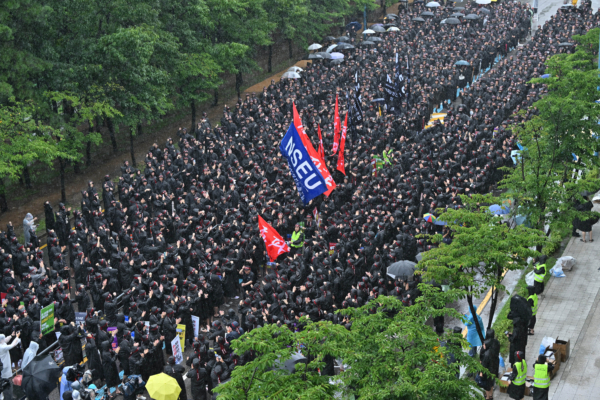Formed in 1969, South Korea’s leading chip manufacturer, Samsung Group, operated without becoming unionized until 2020. On July 8 this year, after stalled labor talks, the National Samsung Electronics Union (NSEU) announced a three-day strike. Two days later, the union announced the strike would be extended indefinitely until its demands were met. The strike, involving more than 6,500 workers, raises significant concerns over how this will affect South Korea’s competitive posture as a global chip supplier.
Samsung Discontinues Union-Free Policy
For more than 51 years, Samsung Group maintained that its union-free policy was the most effective means for nurturing relations with workers. However, in 2019, workers disagreed, and a court of law decided in their favor.
This is when two of Samsung’s subsidiaries, Samsung Electronics and Samsung C&T, were charged with allegedly orchestrating clandestine efforts to dismantle the Samsung Electronics Service union. This resulted in the conviction of 26 Samsung executives by the South Korean Ministry of Justice.
In May 2020, Lee Jae-yong, then-vice chair of Samsung Electronics, announced the company would abandon its union-free policy. This supplied the momentum to expand the union’s influence.
Throughout the first half of 2024, Samsung has been unable to negotiate a settlement with its largest union, the NSEU. The union demands include an added day off from work, across-the-board wage hikes, adjustments to performance bonus criteria, and compensation for economic losses incurred during the strike. The union aims to disrupt production lines to pressure management into concessions.
Samsung Electronics reports that chip production has remained unaffected thus far, with operations proceeding as usual. In the meantime, management has been actively seeking solutions to address staff shortages caused by the strike, which may include the employment of substitute labor.
Despite recovering from last year’s downturn, Samsung Electronics now faces significant challenges in the global chip market. In 2023, its semiconductor business incurred a record deficit of approximately $10.9 billion. While a major leader in global memory semiconductors, Samsung lags in high-bandwidth memory and trails TSMC in chip foundry services (semiconductor contract manufacturing).
Strikes Persist Despite Favorable Union Salaries
Public sentiment across South Korea has questioned whether the Samsung Electronics strike is justified considering that workers are already provided premium compensation among the country’s wage earners. For example, in 2023, the
average annual salary within Samsung Electronics was about $87,000, placing the company’s workers in the top 4 percent of salaried workers nationwide.
Earlier this year, Samsung’s management and employee representatives agreed to a 5.1 percent salary increase, while the NSEU officials demanded a 5.6 percent raise.
Last year, due to a downturn in the semiconductor industry, Samsung Electronics’ semiconductor division recorded a loss of about $10.8 billion and announced a zero performance bonus payout. Previously, workers within this division received performance bonuses equivalent to 50 percent of their annual income each year.
Tensions over performance bonuses escalated toward the end of last year and the beginning of this year, particularly within the semiconductor division, prompting a significant surge in union membership. The number of NSEU members grew from 9,000 last year to more than 31,000, encompassing 24.8 percent of all Samsung Electronics employees, with 90 percent from the semiconductor division.
In 2024, the chip industry enjoyed a business turnaround. In the first quarter, Samsung Electronics’ semiconductor division returned to profitability for the first time since late 2022.
Ahead of the strike, Samsung Electronics’ earnings report in early July revealed an operating profit of approximately $7.5 billion for the second quarter, marking a 1,452 percent year-over-year increase and demonstrating a robust recovery from last year’s slump. Consequently, Samsung reinstated performance bonuses for the semiconductor division for the first six months. This amounted to 37.5 percent to 75 percent of the monthly base salary. The NSEU demanded revisions to the performance bonus evaluation criteria to pursue more substantial bonuses.


















